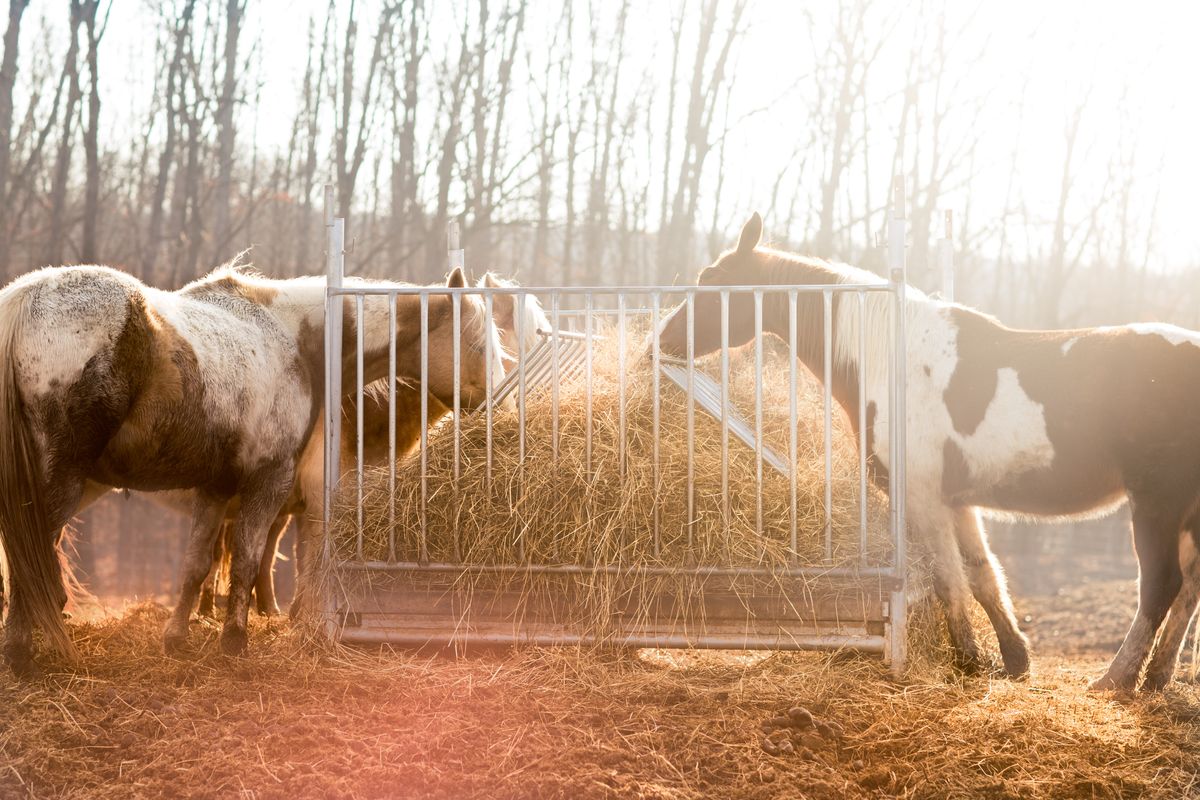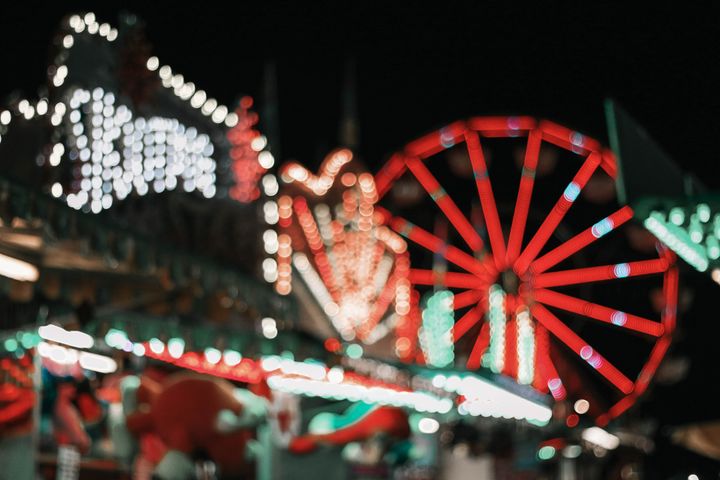Chapter 2: Feeding Time
By the time he reached the feed barn it was a little after six in the morning. He put the wheelbarrow under the shoot and pulled the chain releasing a deafening stream of pellets that fell in a dust cloud which smelled of molasses and grass.

By the time he reached the feed barn it was a little after six in the morning. He put the wheelbarrow under the shoot and pulled the chain releasing a deafening stream of pellets that fell in a dust cloud which smelled of molasses and grass. He pushed the wheelbarrow out to the fence, and he could see the horses already lined up alongside the buckets, kicking at the ground impatiently and shaking their heads. He scooped a few heaps into a bucket and ran his fingers down the back of a mare who snorted and butted her head against him annoyed.
He continued along the fence and finished the bottom pasture before returning to the barn and filling a few ten-gallon buckets from the shoot. He shoved them into the back of the truck and headed up the road to the top pasture to feed the brood mares and geldings.
The sun was beginning to warm the ground and unseen birds called back and forth across the field. Turkeys gathered in the distance at the top of the road heading to the back pasture and a few deer stood wide-eyed flicking their tails near the tree line cautiously picking at the ground without losing their gaze on him. These sights were nice but sometimes forgotten, and after weeks ankle deep in mud pushing the wheelbarrow only inches at a shove while freezing in rain drenched clothes for hours at a stretch, he would almost quit on the spot. This morning the winter was distant, and although he was dry heaving every twenty minutes and his hand felt filled of crushed bone when he picked up a bucket, he was not unhappy.
The geldings crowded the back end of the truck, so he had to flick his whip to keep them at bay as he pulled the buckets to the ground. At first this scenario, repeated daily, had been a constant source of aggravation, but it had since become a game. It was the only time that he got to use the whip, and even though he never hit them, he felt like a lion tamer. The brood mares on the opposite side were different. When he opened the gate, they would try and run and if the truck was not parked in the right spot to block the exit, they would get loose and he would spend the next thirty minutes gathering them from the road down to the stables.
When he drove back toward the stables Mr. Smallwood was on the front porch of his house leaning against a rough wooden column and even at a distance, he could tell his countenance was disapproving. His thick frame was like a boxer, and his broad shoulders made his head seem small even though it too was large with heavy jowls.
Not long after he began mucking the first stall, he was standing behind him.
"Jack. Son. What the hell is wrong with you?" His voice was flat with a deep drawl and he often let his words carry the meaning without help of added inflection.
Jack leaned forward against the pitchfork and tongued the inside of his teeth before turning around to face him.
"Sir?"
"You know damn well you can't just come in here any time you want to feed these horses. They've got a schedule. You go messin with that schedule and you're gonna get their guts all screwed up. And if one of them gets colick you know they're about as good as dead. Now you need to get here on time. Ya hear me?"
He moved the pitchfork along the ground in an act something like contrition and sniffed some hay dust from his nose.
"Hell, son. You act like you're too good to be here."
He smiled with pursed lips and looked up at Mr. Smallwood from under his brow.
"I am too good to be here," he said with no small amount of teasing in his voice.
Mr. Smallwood kicked at the ground with the heel of his boot before shaking his head. He put his hand on the wooden beam of the gate next to him and squeezed it in a palm that nearly wrapped the circumference as if testing its strength. He shook it on its hinges and then walked back out toward the house. When he neared the door, he turned.
"Gloria wants you to come in for few when you're done with the stalls. She's got some food. And God help you when she sees that hand."
He watched Mr. Smallwood fade into the morning sun and laughed, pushing at his knuckles delicately before returning to work.
He left his boots to the side of the door and entered the kitchen which seemed still covered in night because of its coolness even though it was not much darker than it was outside. The heavy scent of bacon grease that had been used and reused more times than he liked to imagine hung in the air and made the room seem smaller. He sat down at the metal table in the middle of the room and traced small circles and uneven lines in the yellow Formica top that was chipped on the corners leaving black ruts. A single beam of light the color of lemon stretched across the room from the window like a cord connected to the wall, which was itself yellow with age. Pictures of family members he had never seen visit the house peered down from behind him, and the counters were littered with ancient utensils that were nonetheless spotlessly clean and still in use. The stove was cleared but dishes sat in the sink from earlier and a coffee cup was left half full in front of him.
Gloria entered the kitchen silently from the small hallway that led to the rest of the house. He had never been in the other rooms. She opened the oven and retrieved a plate which she sat in front of him before turning to the counter for silverware and a cup. He situated himself on the chair and the thick vinyl cushion took a while to reform to his position.
"You don't look well, John," she said without turning to look at him.
In fact, she had not looked at him. She poured some coffee into the cup and sat down across from him. He was nervous about pulling the silverware closer, so his hand remained hidden under the table as he looked at the plate. Eggs, bacon, a biscuit.
"I haven't been feeling well this morning, Mrs. Smallwood."
"Uh, huh." Her voice was deep, and the motherly disapproval was universal in its tone.
She pushed the silverware toward him and after taking a deep breath he pulled his hand out and picked up the fork. She shook her head so slightly that it was almost imperceptible, but he saw.
"You think I've never known a drunk, John?" she said. "And don't you narrow your eyes at me like I'm lyin'."
He hadn't noticed narrowing his eyes, but he was sure he had.
"Just because you wait till after five every day don't make it no better. You hear me?"
He poked at his eggs and noticed the greasy outline left behind on the plate.
"I'm all right, Mrs. Smallwood."
He shoveled a large portion of eggs onto his fork and began eating.
"My daddy was a drunk, and two brothers." She made a sound of agreement to herself and placed her hands palm down on the table. "A man who just has a few drinks with friends don't stare down into eggs thataway when he's called a drunk, and he sure don't walk around with a hand like a baseball mitt."
He straightened up and looked her in the eyes. As soon as he did, he wished that he hadn't. Her gaze was piercing, and her mind was settled.
"I wasn't drinking when this happened."
"That makes it better I guess."
He looked down at his thick fingers seeing them with her eyes.
"It ain't how much you drink, John. It's why."
She leaned into the table and lowered her voice.
"A man that's dead in the street ain't there because he drank too much. He's dead because of why he drank."
She nodded her head slowly and settled back in her chair. She began folding and refolding a kitchen towel. Her eyes fixed on it as if its purpose a mystery.
"What's the matter with you?"
It was hard to tell from her tone if she was asking or berating.
"I'm all right, Mrs. Smallwood. Really."
She put the towel on the table and turned toward the window.
"Why don't you go back to teaching?"
"I can't teach."
"Can't teach."
She rose and walked over to the sink. She turned the water on and let it run before putting her leathery hands into the scalding water and began scrubbing at the dishes without a flinch. He had been angry so many times over this question that he could scarcely bring himself to be angry at all. The passion for it had just settled into him. He made no attempt to argue.
"You're smart enough. You must have learned something, or they wouldn't have given you that diploma. It's a waste you out here cleaning horse shit."
He downed the rest of his coffee and set his fork aside.
"I like cleaning horse shit."
"You need to get yourself right, John. You've been here a year now and you ain't been right yet."
"It's not as bad as you think, Mrs. Smallwood."
He waited for a response, but she made none. He rose and thanked her for breakfast before leaving. She did not turn around.


